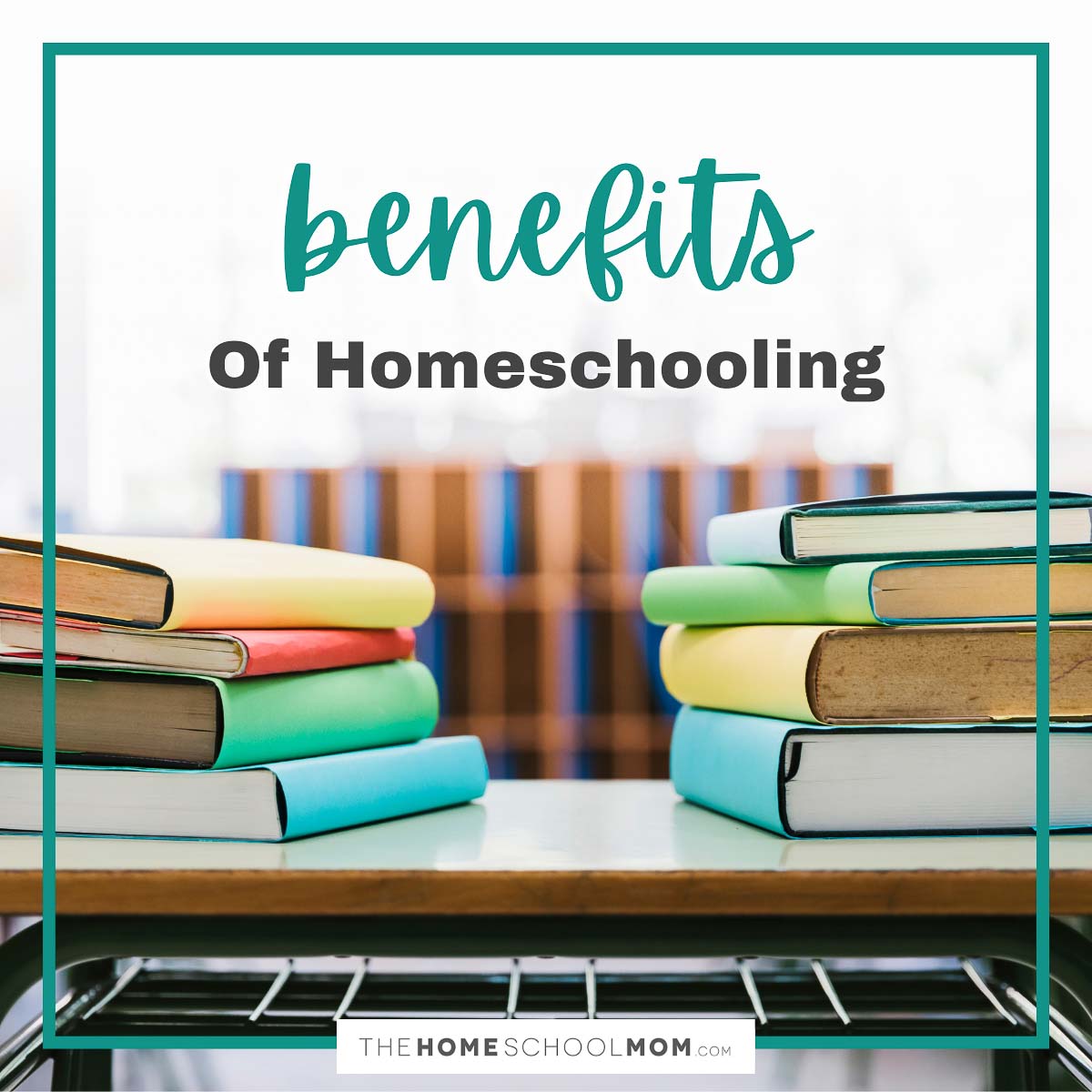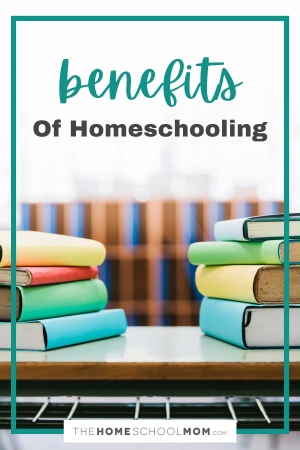The many benefits of homeschooling mean more kids and teens than ever are learning at home. Families want the advantages of homeschooling with the flexibility, academic benefits, efficiency, and opportunities homeschooling can offer. They seek an education and even a lifestyle that's not based on minimum standards and a one-size-fits-all approach.
There are obvious academic benefits of homeschooling, but potential homeschoolers may not have thought of the many other areas in which families can reap homeschooling benefits, including:
- benefits in mental health
- benefits in social development
- benefits in physical health
- benefits in special circumstances
- and even homeschooling benefits for parents!
Below we will take a look at the academic advantages of homeschooling as well as each of the above homeschool benefits.

Homeschooling Benefits
- Academic flexibility. Homeschooling can work whether a child is ahead, behind, strong-willed, creative, challenging, quiet, gifted, or active.
- Parent choice of pace and approach. You're in charge of the schedule, grade level, learning approach, curriculum, and in most places, even graduation requirements.
- Meeting current needs now. You can prioritize a child's mental, emotional, behavioral, and physical health.
- Warm family environment. Family is the best foundation for social development as well as values and faith development.
- Community involvement. There's generous time for service, community activities, volunteering, and entrepreneurship.
- Efficient learning. A low student-teacher ratio, without wasted time and busy work.
- Meaningful learning. Avoid teaching to the test, testing mania in general, and arbitrary minimal standards.
- Time for the stuff many schools cut. You can make time for play, the outdoors, projects, the arts, and real experiments.
- Getting into college. A great transcript with less stress and burnout.
- Accommodating to special situations. Homeschooling works well for military families, families who travel, and families contending with illness and challenging work schedules.
- Legal acceptance. Homeschooling is a way of meeting compulsory attendance laws in every state in the U.S. and in many countries.
Benefits of Homeschooling: Academic
- Customize for your kid. A benefit of homeschooling is the ability to customize homeschooling for all kinds of kids. There are ways to tailor homeschooling for kids who are behind, kids who are gifted or advanced, kids who have ADD/ADHD, and kids who have special needs. You can customize for your child's learning styles and preferences.
- Choose what works. Another benefit of homeschooling is parental choice in the basic elements of education. You can choose your own curriculum and resources, helping your child learn different subjects or from different viewpoints. You can help your child learn at the level she is ready for rather than being locked into an arbitrary grade level. She could even be at one level for reading and a different level for math. You can homeschool according to a schedule that works best for your child and your family. In most states, parents can even set their own graduation requirements, helping teens prepare for work, a creative life, or college with high school years that make sense for that individual child. You can also even find benefits to starting homeschooling in the high school years.
- Create efficient, effective learning. A benefit of homeschooling is its efficiency and effectiveness. With a low student-teacher ratio, little time is wasted during the day standing in lines or waiting for others to finish. You can choose from a variety of homeschooling styles or approaches. You can help your child with contextual learning or by pursuing passions. Many parents find interest-led learning leads to developing skills and knowledge across all academic areas. Rather than focusing on weaknesses in a way that can make a child lose confidence, a benefit of homeschooling is strengths-based learning. Parents can build inquiry-based learning into their days, helping kids grow their critical thinking, which is a huge benefit of homeschooling. Yet, you don't have to have an education degree or be "a teacher" to homeschool well; as the parent, you're the expert on what your child needs.
- Differentiate from school. Another benefit of homeschooling is that you can take advantage of the fact that homeschooling is different from school. Parents can value individual potential rather than school-based minimum standards, and they can get away from public education's focus on standardized testing. Parents can also shape homeschooling so that learning is in tune with what we actually know about child development. We know that young children learn best through play, and we know that children develop on their own timetables. Sometimes children benefit from homeschooling with an emphasis on later academics. One of homeschooling's benefits is that children can continue to build content knowledge even during a lag in skill development. There are so many school things homeschoolers do not have to do, which is a big advantage of homeschooling. Many parents do not use testing or grading, or at least not until the high school years.
- Focus on life skills. Solid preparation for adult life is an additional benefit of homeschooling. Spending more time in a household provides more time for the everything from learning to cook to learning to budget. Parents can make "adulting" part of living and learning.
- Extreme achievement or passion. A teen who is training as an Olympic athlete or dedicated to another all-consuming interest may find a homeschool schedule more compatible with her training and intensity.
- Getting into college. Teens can effectively prep for college with good homeschool transcripts for admission and with less burnout on busy work. Homeschooled students benefit by standing out for college admissions just by having had a different experience, but also because they may have had opportunities to follow their interests in a deep way.
- Preparing for a vocation or entrepreneurship. Teens who want to go directly to work can focus on vocational training, sometimes even starting with informal apprenticeships or mentorships during the high school years. Many teens also gain entrepreneurial experience while they're young, and they can transfer that business experience to post-high school start-ups.
Benefits of Homeschooling: Mental Health
- Focus on mental health. If a child is struggling with anxiety, social anxiety, depression, or challenges to brain health, a benefit of homeschooling is the opportunity to focus on mental and emotional well-being. Parents can make therapy, coping skills, and medical care the priority, which will then enable the academic growth they hope to see in their child.
- Get out of a bad situation. Sometimes mental health issues may be connected to negative school situations, and an advantage of homeschooling is getting a child out of that bad school situation. This could mean safety from bullies, a reduction in school-induced stress, a new lens on school refusal, and greater self-acceptance and connection to self. A benefit of homeschooling is that you can choose to homeschool short-term to create a better situation for your child.
- Encourage autonomy and independence. Studies show that a huge factor in effective learning is a strong sense of autonomy, and a benefit of homeschooling is cultivating children's autonomy. Homeschooled kids can help make choices about how and what they want to learn. They can learn around their interests and curiosity and not just for a grade or to please a teacher. In fact, parents can choose to avoid or reduce the emphasis on behavior modification that is so prevalent in schools, helping children to develop intrinsic motivation, a common benefit of homeschooling.
- Immerse children in caring families. One of the classic mental health benefits of homeschooling is just being at home, surrounded by people who care.
Benefits of Homeschooling: Social Development
- Enjoy close family relationships. Growing up in a close family helps build healthy social connections. Parents, grandparents, and other relatives are role models, can impart values, can work through conflicts positively, and can coach behavior.
- Foster less peer dependence. Less early exposure to the negative aspects of the public school environment.
- Help deal with difference and stereotypes. More acceptance of the nerd factor, families can accept strong girls and sensitive boys, less stigma for kids with learning differences, can avoid attending schools where racial division or prejudice is entrenched.
- Emphasize community involvement. Time for volunteering, voting with mom and dad, and participating in community activities with peers and people of all ages and backgrounds. Homeschooling lets you homeschool the heart and hands as well as the head.
- Build a sense of safety. Parents can take their own steps to keep their children physically safe, and children can feel secure.
Benefits of Homeschooling: Physical Health
- Prioritize moving more. Your child can move more, play outside, spend extra time on things like dance and sports, connect with nature, move while learning academics, and gain confidence with time for skills practice.
- Prioritize sleep. Allow your child and yourself to get more sleep and wake up more naturally. Plan sleep schedules around activities. Adjust to teens' changing body clocks when they stay up later and sleep later.
- Manage illness. Help a child recover from illness with reasonable expectations, no busy work, and less stress from being told he's "getting behind." It's ok for healing, recovery, and coping to be most important!
Benefits of Homeschooling: Special Life Circumstances
Homeschooling can work to ease the way for families who are:
- In the military. Instead of changing schools frequently due to relocations, you can keep homeschooling no matter how many times you move.
- Experiencing illness of parent, sibling, or grandparent. Sometimes it's more important to emphasize spending time together than doing lessons. Sometimes families work better when school and medical schedules don't conflict. Sometimes homeschooling needs to happen in Mom or Dad's bed.
- Allowing grief to progress naturally. When the most painful circumstances arise, homeschooling can allow a family the time and space to grieve and heal together, in their own unique way.
- Living a unique lifestyle. Some people are roadschooling or boatschooling with the kids; some families have one parent living away or traveling, and kids can join them sometimes. Some parents work shifts or attend college or grad school and are able to spend more time with their children by homeschooling on a schedule that works for them.
Benefits of Homeschooling: For Parents
There are even benefits of homeschooling for parents.
- Continuing education. You can continue learning alongside your child. Learn a foreign language, brush up on algebra, rediscover maps of the world, learn to code, visit museums, and enjoy field trips.
- Sharing your hobbies and interests. You can share your own passions with your kids more than if they were attending school full-time. Hike the Appalachian Trail, study the constellations, share your knowledge of home construction or investing, play music together, work together on political or social causes.
- Saving money. Some aspects of homeschooling can be less expensive than school: fewer expensive school clothes, off-season vacation and travel rates, no public school fees or private school tuition. Some parents spend a lot of money on homeschooling; others homeschool on a budget.
- Freedom from a school schedule. Homeschooling means you're not tied to the timing of the school bus or school schedule. Plan your homeschooling schedule so it works for your family. You can homeschool at night, on any kind of weekly schedule, or any kind of yearly schedule.
- Personal growth. Because it's an immersive experience with your children and it's taking total responsibility for their education, homeschooling can change you. Parents can grow in philosophical, spiritual, or social-emotional ways. Some people find homeschooling can be a source of personal empowerment, a shared journey where you and others recognize the value, labor, and challenge of nurturing children and helping them learn.
Of course, despite all the benefits of homeschooling, there is no homeschool guarantee. Kids are kids, and some kids who go to school have challenges, just as some kids who homeschool have challenges. There are thousands upon thousands of homeschoolers around the world, and their homeschooling experiences and outcomes vary, just as happens with children who are enrolled in schools.
It's also possible to homeschool poorly, though perceptions of what good homeschooling looks like may be uninformed or inaccurate. One of the advantages of homeschooling that people forget about is that you can quit homeschooling if it doesn't work for your family.
While homeschooling is not for every family, people from all walks of life in many different circumstances have found ways to incorporate the benefits of homeschooling into their lives.




